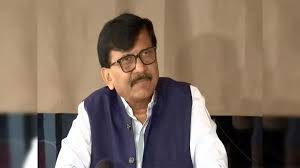‘Not our stand in Maharashtra. We speak Hindi’: Uddhav Sena distances itself from Stalin’s language remark

Mumbai, July 7, 2025 — The Uddhav Thackeray-led Shiv Sena (UBT) has distanced itself from Tamil Nadu Chief Minister M.K. Stalin’s recent anti-Hindi comments. The party stated that Stalin’s position does not reflect its own or the sentiment of Maharashtra’s people. It emphasized that Hindi is widely spoken in the state and must be respected.
Stalin, who heads the DMK and is a prominent INDIA bloc leader, recently said Hindi imposition must be resisted. His comment stirred controversy and drew criticism from both allies and opponents. In response, the Uddhav Sena issued a clarification to reassure its voter base.
‘We Speak Hindi Here, Respect All Languages’
Uddhav Sena MP Sanjay Raut told reporters in Mumbai, “Stalin-ji’s views are based on Tamil Nadu’s context. Our stand in Maharashtra is different. Hindi is commonly spoken here. We speak Hindi, Marathi, and other languages with equal pride. We support linguistic unity, not division.”
He explained that every regional party in the INDIA bloc has its own linguistic and cultural outlook. But these differences should not be mistaken for disunity. “Tamil Nadu has a long history of resisting Hindi imposition. Maharashtra’s situation is not the same,” Raut said.
Stalin’s Comment Rekindles Language Debate
Stalin made his remarks at a DMK rally in Chennai. He reiterated the party’s long-standing opposition to Hindi dominance. He asserted that Tamil would always define Tamil Nadu’s identity.
The statement echoed the DMK’s core ideology. It resonated with many in Tamil Nadu but made alliance partners in other states uncomfortable. In states like Maharashtra, where Hindi has deep roots, such comments risk creating political friction.
Uddhav Sena Moves to Reassure Maharashtra Voters
The Sena’s quick response seems designed to calm concerns among Hindi-speaking voters. Mumbai and several parts of Maharashtra have significant Hindi-speaking populations. The party wants to avoid any backlash ahead of the upcoming state elections.
Political analysts see the clarification as a calculated move. “The BJP often claims that opposition parties are anti-Hindi. Uddhav Sena wants to avoid falling into that trap,” said political commentator Prakash Jadhav.
BJP Slams Alliance Over Contradictions
The BJP seized the opportunity to attack the opposition alliance. Party spokesperson Shehzad Poonawalla said the INDIA bloc lacks a common ideology. “One ally insults Hindi, another defends it. This confusion proves the alliance is a political patchwork,” he said.
Union Minister Narayan Rane also criticized the alliance. He said the DMK had insulted Hindi before and its allies kept silent. “These repeated remarks show the INDIA bloc has no respect for Hindi-speaking citizens,” he added.
Balancing Unity and Diversity in the INDIA Bloc
Language remains a sensitive issue in Indian politics. The INDIA bloc includes parties from linguistically diverse states. They share common goals on national issues like inflation and unemployment. However, cultural and ideological differences often surface.
The language debate has exposed one of the alliance’s key challenges: managing unity while respecting regional priorities. How the bloc handles such differences could shape its future credibility.
India’s Complex Language Landscape
India’s linguistic diversity is both a strength and a challenge. The 1960s anti-Hindi agitations in Tamil Nadu led to a policy that supports all major languages equally. Hindi, English, and regional languages are all official in different states.
Still, any hint of Hindi imposition sparks sharp reactions in the south. In contrast, Maharashtra has a long tradition of bilingualism. Both Marathi and Hindi are widely spoken in cities like Mumbai, Pune, and Nagpur. The Uddhav Sena understands the need to respect this balance.
Conclusion: Clarity Amid Coalition Complexity
As the INDIA bloc prepares for future elections, handling internal contradictions will be crucial. The Uddhav Sena’s quick clarification on the Hindi issue shows its awareness of local concerns.
It also demonstrates the party’s effort to maintain a united front without compromising regional identities. Whether this careful balancing act will pay off electorally remains to be seen. For now, the message is clear: Uddhav Sena stands by Maharashtra’s linguistic harmony — with Hindi, Marathi, and all Indian languages treated with respect.s rooted in Maharashtra’s pluralism.”






